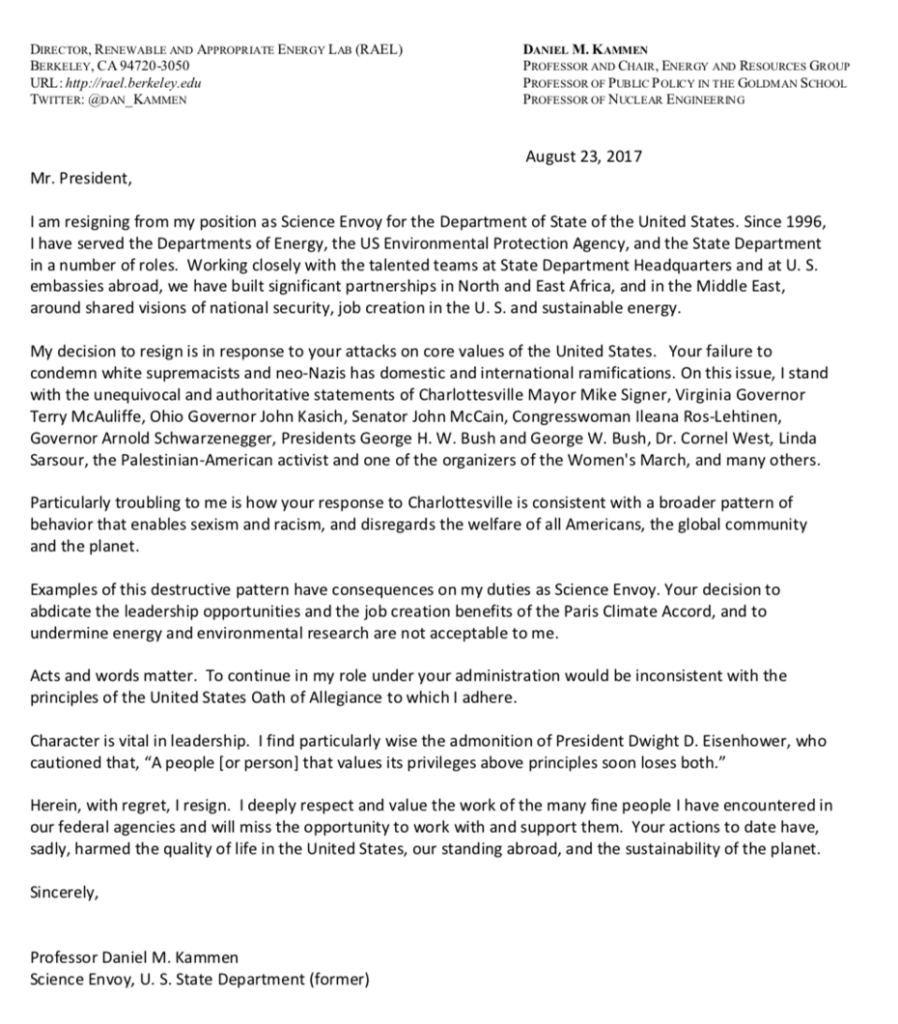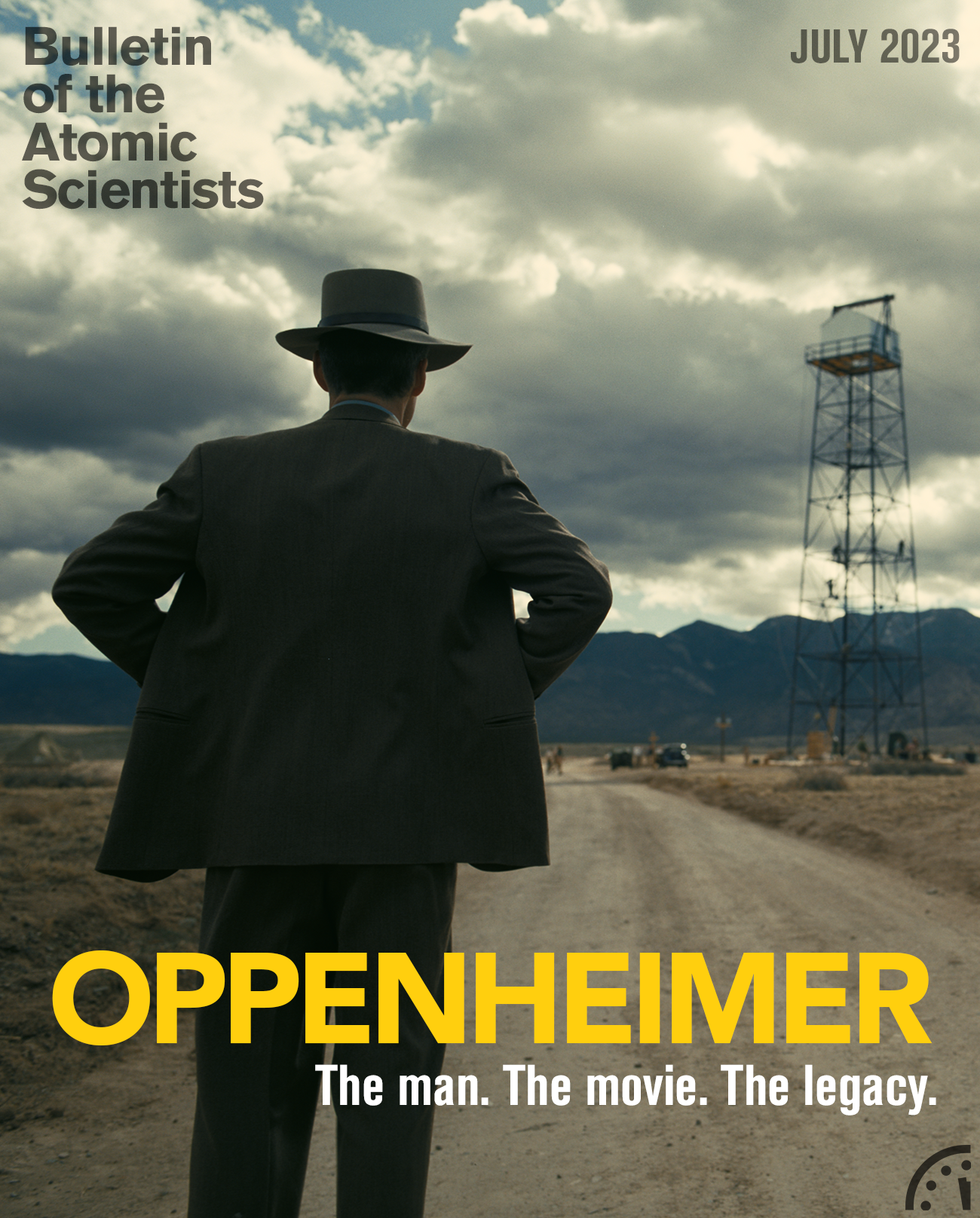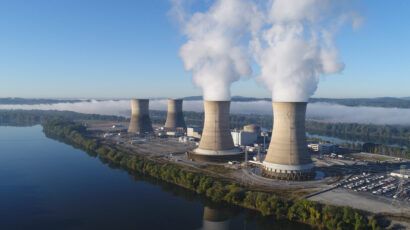Why what happened to Oppenheimer then is relevant now
By Daniel M. Kammen | July 17, 2023
Why what happened to Oppenheimer then is relevant now
By Daniel M. Kammen | July 17, 2023
I did not experience anything like what J. Robert Oppenheimer did. I was not forced out of government service on specious grounds during a McCarthy-era purge. But I did experience the cognitive dissonance that some Manhattan Project scientists may have felt, as they watched the United States go in a dangerous direction by developing thermonuclear weapons and sparking a nuclear arms race with Russia. The Trump administration’s denial of climate change and climate science put me in the situation of choosing: Could I do more good on the climate front by staying in government, or by leaving and thereby calling out a national climate, energy, and social justice wrong-turn?
The tension over service or conviction led me to ask myself: What does it mean, “To serve”?
This kind of question comes up surprisingly often in conversations among my colleagues and me, because many of the academics I work with across the science/policy/activism nexus move in and out of government service as part of their normal career trajectories. Personally, I find public service is a natural—and highly logical—extension of my research and a means to collaborate to bring about needed change.
I have served internationally, formally for the United Nations, as a contributing and then coordinating lead author for the Intergovernmental Panel on Climate Change, which shared the 2007 Nobel Peace Prize, and at the World Bank as senior technical advisor for renewable energy and energy efficiency. In addition, I have served on a number of state advisory and research boards.
I have also served in various federal roles: in the Clinton and Bush administrations (nuclear generation IV reactor review board); the Biden administration (senior advisor for energy and innovation at the US Agency for International Development); and in the Obama administration (on the US Environmental Protection Agency’s National Environmental Policy Advisory Committee).
Perhaps the position I most valued and found to have had the most impact was as an unpaid appointment as science envoy in the US State Department. I was asked to serve in 2016, in the final year of the Obama-Biden Administration, under Secretary of State John Kerry, where I focused on climate and energy, with a regional emphasis on Africa and the Middle East. Science envoys are appointed annually, and my term extended until October 2017. Donald Trump was elected in November 2016—an event that shocked many who watched the election returns live as dawn struck in Marrakech, Morocco, where several hundred of us were in the US delegation to an international climate convention. I received anguished calls from friends and students around the world and back home at the University of California, Berkeley.
My resignation from the science envoy post was not something that I wanted to do. I was deeply immersed in work with several governments and countries in Africa and the Middle East, as well as universities and civil society groups that had requested my work towards their clean energy science, engineering, and policy goals. I valued the work and felt I was making a difference.
However, with every day in office, it became abundantly clear that not only was President Trump intent on destroying meaningful scientific research on climate and clean energy, but his efforts in other spheres were just as irresponsible and dangerous. Withdrawal from the Paris Climate Accords was an action I deplored, but so too were a wide range of other decisions—including his terming a number of nations “shit-hole countries,” to seemingly praising racist and ultimately homicidal acts at an otherwise peaceful rally in Charlottesville, Virginia. This is by no means an exhaustive list, but just a few of the low points from the full record of the 45th presidency. I could fill volumes on what I regard as unconscionable acts committed during his term in office, including but not limited to his orchestrating an armed assault on the nation’s Capital.
It became clear that despite the work I so very much valued, service in such an administration was, at minimum, hypocritical. My concerns over leaving were amplified by the requests from governments—in Egypt, the Congo, Kenya, Kuwait, Morocco, Senegal, South Africa, South Sudan, Tanzania—and from universities and non-governmental groups. What they most requested were meaningful, extended partnerships to build technical, managerial, and financial capacity to invest in climate and social programs.
Ultimately, I made the decision to depart.
I don’t want to overstate the case: I was a volunteer in government, in a position that is not Senate-confirmed. Further, mine was just one of several resignations from the State Department during the first year of the Trump administration. Many career diplomats and officials expressed concerns about the direction of US foreign policy under the new president.
I did, however, do a bit of research and due diligence on resignations. The most interesting aspect was observing others’ reasons, decisions, regrets, and impacts. In fact, the science-policy field has a number of valuable lessons. Several scientists protested by resigning from federal and national laboratory positions in response to the removal of J. Robert Oppenheimer’s security clearance as the result of Cold War-era political persecution.
In a 1952 interview, Oppenheimer’s friend, the professor of romance languages Haakon Chevalier, recounted being asked a decade earlier to potentially pass information about the Manhattan Project to the Soviets—our war-time allies. He had mentioned the failed Soviet attempt to reach out to Oppenheimer in the winter of 1942, who called it potential treason and flat-out refused to hear any more. Oppenheimer, did not, however, immediately report the incident to authorities in the intelligence community but waited a few months. This delay (and the fumbling explanation for it) ultimately led the US government to strip Oppenheimer of his security clearance a dozen years later—something that was later acknowledged to be a flawed decision. Sixty-eight years later, in 2022, the Biden Administration reversed the injustice that had been done to Oppenheimer—and an injustice it was, regardless of one’s perspective on the outcome of the Manhattan Project.
In developing my letter, I also examined a number of other resignations, including:
*Gen. Douglas MacArthur’s 1951 farewell address: MacArthur was relieved of his command during the Korean War after publicly criticizing President Truman’s policy decisions. In his farewell address to Congress, MacArthur famously declared, “Old soldiers never die; they just fade away.”
*John F. Kennedy’s 1960 resignation letter from the Senate: In 1960, JFK resigned from the US Senate to focus on his presidential campaign. In his resignation letter, Kennedy expressed his gratitude for the opportunity to serve in the Senate and acknowledged the “difficult and critical times in which our nation lives.”
I list the above largely because at the time they convinced me that even for a position I greatly valued, resignation was in fact—perhaps ironically—the best way to serve both the US government and civil society.
It is on this point, however, where I had the most ambivalence. Many government officials remain in their jobs despite serving in administrations with which they strongly disagree—and often highlight how they will endeavor to do all they can for the country by “working from the inside” to effect change to policies with which they disagree.
I found myself deliberating “Should I do the same?” Was resignation just grandstanding, when I had a university position to return? Legitimate concerns and arguments exist on both sides.
Ultimately the resignation letters I read convinced me that the greater value was to act out.
Most immediately before my action, the Presidential Commission on the Arts resigned en masse, with a letter that included the Acrostic “R-E-S-I-S-T” (O’Keefe, 2017). This provided a natural template that I ran with, shall we say. After drafting my letter, I shared it with a number of colleagues for comments, as well as with the new Secretary of State, Rex Tillerson (who was subsequently fired—via Twitter—by President Trump in March, 2018).
My letter (see figure below), to be sure, did generate a range of responses (see figure 1 at top of page) and went viral in just a few hours. To the amusement of my daughters, for a brief “15 minutes of fame” I was out there with as many comments per hour as Taylor Swift. Amusingly, several reporters opened their inquiries and interviews with the question: “Was it intentional?”

In the aftermath of my resignation, I received a great deal of support but also a range of very ugly and worrying hateful messages, including many whose obscenity-laced statements echoed variations of “may the door hit you on the way out” and “good to get you off the federal payroll” (regarding my unpaid position).
Six years later, what have I learned? Quite a lot, actually.
First, it was heartwarming to see the number of colleagues in government service who commented that my decision empowered them to push harder for the clean energy transition— even if this is what I wanted to hear.
Second, the response to my letter helped some to see more clearly how climate and clean energy could be leveraged into the political dialogue. This is a more complex issue given the large and important history of environmental activism. But still, I’d like to think that, as Che Guevara said: “The revolution is not an apple that falls when it is ripe. You have to make it fall.” Now, of course, we are seeing far more courageous climate activists in many settings, and in particular among the incredible youth climate and environmental justice leaders. I can only hope that standing up for what is right never goes out of style.
Finally, I do think that there is a key lesson to be learned in the decision to rescind the denial of Robert Oppenheimer’s security clearance. We all must evolve and address new challenges by, in part, revisiting our past in light of new data, new challenges, and new opportunities.
Since 1999 I have been a coordinating lead author for the Intergovernmental Panel on Climate Change—which shared the 2007 Nobel Peace Prize for work detecting and then analyzing pathways to address the climate crisis. In 1999, the science of the climate crisis was clear to most, but not all scientists, and the economics and politics of the crisis was less clear. Now we have seen the first few waves of climate damage: massive fires; heat waves; dramatic changes in arctic ice and in the ocean. Huge new risks await us in the anthropogenic greenhouse, including food crises, disease, migration, ecosystem collapse, and more. We have known of climate solutions for years, and today—thanks to materials science, deployment policies, and market transition in the solar, wind and energy storage fields—it is now cheaper to build a new clean energy power plant than to operate an existing fossil-fuel power plant (Mathis, 2021). This is a statement that is worth repeating, as it often seems to get lost in any discussion of clean energy: It is cheaper to build and operate a new solar or wind plant than to run an existing coal-fired power plant.
Sadly, that information has—so far—not been enough to dramatically accelerate the arrival of the clean energy world we should have. We need other forces and motivations. My research today is focused on the joint challenges of energy decarbonization and on social justice (Sunter, Castellanos & Kammen, 2019). It is clear, scientifically and socially, that we cannot solve the climate crisis without recognizing and addressing the crisis of inequality and marginalization in society. Similarly, we cannot address our huge social challenges without recognizing how unaffordable energy and repressive institutions continue to exclude much of humanity from the meaningful participation we need to face the challenges ahead.
The return of Oppenheimer’s security clearance, even posthumously, shows some of the ways that humanity can evolve. Prior politically based opposition to new ideas—like the climate “solutions science” that defines my own work—can become central to new approaches to challenges (Kammen and Dove, 1999; Bailis, Ezzati & Kammen, 2005).
We must pursue both the exciting new “cutting edge” science and that which sadly seems “mundane” to some, such as efficient heat pumps, clean cooking, making clean energy services available to all (not just the rich), protecting biodiversity, and building social equity into both the built environment and in how we see and restore nature.
Together, we make the world safer.
The Bulletin elevates expert voices above the noise. But as an independent nonprofit organization, our operations depend on the support of readers like you. Help us continue to deliver quality journalism that holds leaders accountable. Your support of our work at any level is important. In return, we promise our coverage will be understandable, influential, vigilant, solution-oriented, and fair-minded. Together we can make a difference.
Keywords: 2024 election, J. Robert Oppenheimer, McCarthy, Trump, climate denial, science, science-policy
Topics: Opinion, Personal Essay



















